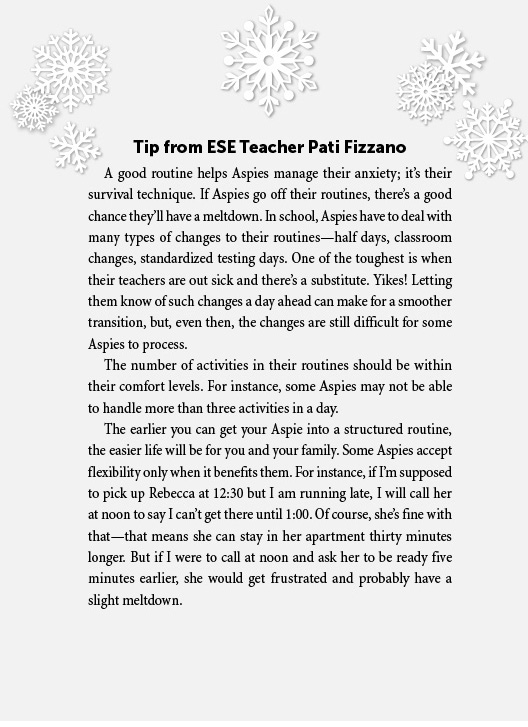
It’s a hard thing to leave any
deeply routine life, even
if you hate it.
—John Steinbeck, East of Eden
Helpful Hint: Aspies depend on the comfort and familiarity of positive routines. To create a successful routine for an Aspie, build it one step at a time; this will give the Aspie confidence in it. If a routine that’s going well needs to be altered, change it bit by bit or in chunks rather than all at once. Since Aspies don’t like changes or surprises in their surroundings, if you see a change coming to their environments, give them as much advance warning as possible. The more major the change, the more critical the preparation.
Comfort. Routine. Familiarity. Knowing where things are. Knowing how a trusted individual will act. These things give Aspies the security they need in their activities and their surroundings. Aspies have a hard time adjusting to new environments, new people, and new activities. If all five of their hypersenses get overloaded by unfamiliar stimuli and sensations, Aspies will have to do a major readjustment and may very well have a meltdown. They must greet and deal with new people. They have to learn new geography. But it overwhelms the Aspie brain. When they go someplace new and leave their familiar routines behind, it takes them a while to get comfortable.
Imagine you’re an Aspie. You are preparing to face the new day, and you look forward to it because you’re in a good routine. You put on your favorite sweatshirt, your most comfortable jeans, your sweat socks and sneakers, and you’re set to go! Next it’s your standard breakfast: a bowl of melon and strawberries, a toaster waffle smothered in butter and syrup, and a glass of milk. You love your routine: doing the same things every morning in the same order. Life is good.
Then the phone rings. Or worse, the doorbell rings. It’s your parent (or friend or coach) saying the plans have changed. Your routine is suddenly changed as well. You think, “Wait a minute. Today you want me to dress up in a suit and tie? And wear black leather shoes? It’s not fair. Why did you get me into that good routine in the first place if you were just going to take me out of it? I’m back at the start of the maze again. Now
you’re pointing at your watch and yelling at me. You don’t understand how a loud voice reverberates in my head. I see you’re disappointed in me, but I don’t know what to do. All I want to do is eat my usual breakfast, but you’re saying there’s no time, we’ll have to grab a quick bite at some restaurant I’ve never heard of. . . .”

It’s not that you should never ask an Aspie to wear a suit or have a different breakfast. But you should respect her routine if it’s working. If the routine is accomplishing its goal and it’s socially acceptable in the real world, it should not be belittled or discarded. It’s taken your Aspie a while to get comfortable with a routine that is helping her navigate the activities of daily living. If you’re going to ask her to change that routine, you should have a good reason. You should also give advance notice, an explanation of why the routine is being changed, some encouragement, and maybe some help and preparation adapting to the new set of tasks.
If Aspies fall out of a positive routine, one with good structure and activities, or they are asked to change it, it can be difficult for them to get back into that routine or to start another positive one.
Holidays and summer breaks are challenges for Aspies because it takes them out of their school routines. During any holiday break, families should try to keep their children’s routine as intact as possible by sticking with their established daily structure as best they can. They should wake up at the usual time, eat at the usual time, and go to bed at the same time. Try to keep the number of activities down to a manageable few.
If you decide to go on vacation, the Aspertool is to prepare them as much as possible so they will feel comfortable in their new surroundings. Find pictures online of where you’re going and show them to your Aspie. If you’re taking a cruise, show her the ship’s layout ahead of time.
For an upcoming holiday party or event, parents might want to role-play with their Aspies in terms of what they’ll be doing at the event, where they’ll be sitting, who they’ll be sitting with, even what’s on the menu. Letting them know as much of this as possible will eliminate any surprises for the Aspie. (Aspies tend not to like the unexpected, so forget that surprise birthday party you were thinking about.) Plan for the possibility of an anxiety attack or meltdown (this may include bringing a sitter). But do not cancel the event, as this might upset the other children and spouses.

Even neurotypicals enjoy the comfortable routine of familiar surroundings. Remember how frustrating it was when you went to a new supermarket and couldn’t find the tomato sauce? The first time I went to a Costco, I went with someone who shopped there all the time. I tagged along like a little kid, since there were no signs to indicate where anything was.16 That day it took me forever to find everything on my list. My second trip there was only slightly more efficient.
16 I once saw on a TV documentary that Costco eschews signage because they know the customer ends up buying some 20 percent more stuff that way.
Supermarket shopping is anything but routine for an Aspie. Try to understand why it’s so overwhelming. First, Aspies must generate a shopping list. Then they have to arrange to get to the supermarket. Once there, they have to navigate that store’s unique layout to find all the items on their lists, all the while battling the fluorescent lights and trying to tune out the chatter of all the customers and deal with their close proximity to the Aspie. To Aspies, a large supermarket seems like a foreign country. That’s why many of them avoid food shopping altogether. If they do go to a supermarket, they need a lot of advance preparation.

Imagine you’re an Aspie. You love the comfort level of routine and predictability. But today your mom has brought you with her to a new supermarket. The lighting is strange. So many colors. So many aisles. So many signs that make no sense. You don’t know where anything is. The wheels of the shopping cart squeal. The fluorescent lights hum. An elderly couple is arguing over which brand of aluminum foil is a better deal. A man is talking loudly into his phone, asking someone which items he needs for dinner. Too much noise for you to focus. And while you’re trying to navigate your way through the maze of food aisles while your senses are under assault, your mom shoves a shopping list in your face and starts talking to you about tonight’s dinner. You might feel a little bit clumsy as you attempt to traverse the foreign surroundings.
Rebecca surprised us when she broached the subject of moving from her beautiful apartment in one of the most secure rental apartment complexes in Fort Lauderdale. This was a big transition, but it was something she deeply wanted. As I came to learn from Pati, things go much better when the Aspie is involved in the decision-making. Rebecca told us she had found an independent living facility that was farther away but still relatively nearby. A few months later she moved to this campus that provided her with her own apartment, some life coaching, and transportation for those who could not drive.
After moving into her apartment at the facility, she began shopping at the nearby Publix but would go only if her coach accompanied her. Just as Rebecca began to get into a comfort zone for shopping there, her guide-coach had to take a short leave from the independent living facility. Her mentor, Pati, filled in for the coach to take Rebecca shopping, but this change in routine took Rebecca out of her comfort zone. When her coach returned, she drew Rebecca a diagram to serve as a road map of the Publix, which was a big shot in the arm for Rebecca. Not only did she get back into her comfort zone, but she began to feel truly confident in shopping. With this visual Aspertool, she’s become more independent with her shopping. Soon she may not think twice about shopping, with or without her coach.
ACTION PLAN: Give your Aspie advance notice and help her prepare if there’s going to be a change in the routine or if she will be put into a new environment. Routine is important to her. Think long and hard before you change it. Even when she is in a positive routine, keep your eyes open for any negative habits you might observe your Aspie falling back into; this might be a sign she is slipping out of the routine. And once she falls out of the routine, it can be tough for her to get back into it. But with help, she can do it.


